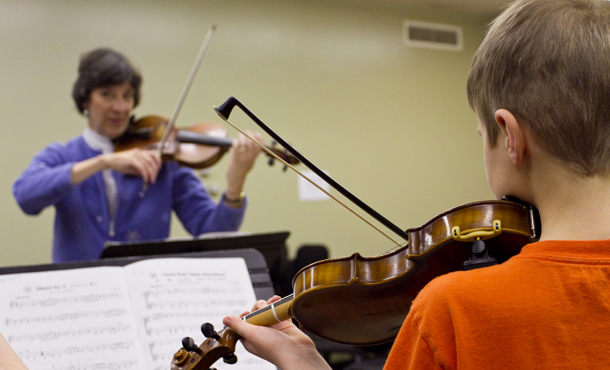The Shenandoah Valley Preparatory Music Program at Eastern Mennonite University will begin music lessons for individuals hoping to learn a new instrument, or improve skills, starting Jan. 13.
A given lesson will range from 30 minutes to an hour in length, once a week, at a time that best suits the individual’s schedule. Instructors will show students the basics of instruments including the guitar, piano, violin, cello, viola and flute.
The program was started in 1988 by EMU alum Wanda Teague Alger, who taught local children to play musical instruments in her spare time. As the popularity of her lessons grew, Alger approached EMU regarding the possibility of starting a program at the school, as it provided a larger forum for learning, along with additional instructors. The program came into fruition that same year.
The following year, Teague exited the program as East Carolina University graduate Sharon Miller took over the role of administrative director.
“I’m also a violin teacher for the program,” added Miller, who has been playing the instrument since grade school. “This program is very unique in that we offer both traditional and Suzuki lessons, which are not offered anywhere else in the area.”
The Suzuki method of learning is a nontraditional process of teaching music – started by Japanese violinist Shin’ichi Suzuki in the 1960s – that has since gained popularity across the world. In this method, individuals initially learn music by ear, followed by learning to both play the instrument and read sheet music. In the traditional approach, students learn to decipher sheet music initially.
As Miller points out, a unique aspect of the Suzuki method is that individuals can start lessons as young as age 3, given that the method is based on language learning.
“The goal in Suzuki is that you can learn and engage in music either way,” she explains. “Just by hearing something and being able to figure it out right away, or being able to read music and learn it that way; it is much different from the traditional method.”
Twenty professionally-trained instructors will teach either method, depending on an individual’s preference. As the students’ ages can be as young as 3, parents are also welcome to be present at lessons.
The parents, as Miller point out, are often referred to as coaches, in that they stand on the sideline, overlook how the lesson is progressing, and perhaps even give suggestions during the session.
“[Parents] come to the lesson, sometimes learn with the child, and watch how the teacher works so that they can assist in at-home practices,” Miller explains.
Adults are also welcome to register, as there is no age cap.
While lessons begin Jan. 13, an orientation meeting will be held Jan. 9. Registration may be available after Jan. 13, depending on space available. While 235 students are enrolled currently, spots are available for lessons in violin, guitar, piano and flute. The program concludes with a performance by the students in early May.
“The great thing about this program is that it doesn’t tie [the student] to one method of learning,” says Miller. “We want the children to succeed and we want them to enjoy learning the music.”
Courtesy Daily News Record, Jan. 2, 2014
